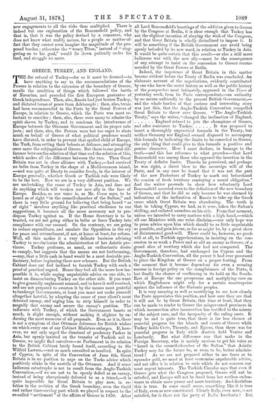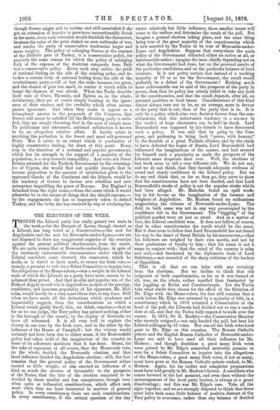GREECE, TURKEY, AND ENGLAND.
THE flat refusal of Turkey—for so it must be deemed—to have anything to say to the recommendations of the Towers in relation to the extension of the boundary of Greece,
recalls the condition of things which followed the battle of Navarino, and preceded the first European guarantee of Greek independence. Then, also, Russia had just beaten Turkey, and dictated terms of peace from Adrianople ; then, also, terms had been recommended to the Porte by the Great Powers of Europe, in relation to Greece, which the Porte was most re- luctant to consider ; then, also, there were many to admire the spirit shown by Turkey, and to condemn the interference of Europe between the Ottoman Government and its proper sub- jects; and then, also, the Powers were but too eager to abate much on behalf of Greece of what political prudence would
have dictated, in order to prevent that spoiled child of Europe, the Turk, from setting their behests at defiance, and attempting -once more the subjugation of Greece. But there is one great dif- ference between the solution of that time and the solution of this, which makes all the difference between the two. Then Great Britain was not in close alliance with Turkey,—had received , -no bribe from Turkey in the shape of a Mediterranean island, —and was quite at liberty to consider freely, in the interest of Europe generally, whether Greek or Turkish rule were likely ! to be the best. Now we are in a very different position. We are undertaking the cause of Turkey in Asia, and dare not do anything which will weaken our new ally in the face of Europe. Besides, as our voice is, as Mr. Cross says, to be heard as of right "in the council-chamber of the Sultan," and there is very little ground for believing that being heard "as ,of right" involves anything like practical obedience to our I suggestions, it becomes all the more necessary not to pre- ' -dispose Turkey against us. If the Home Secretary is to be trusted, we are not going either to bribe or force Turkey into , all Lord Beaconsfield's boastings of the addition given to Greece by the Congress at Berlin, it is clear enough that Turkey has , not the slightest intention of obeying the wish of the Congress, and that Great Britain is wholly disinclined to impose it. It will be something if the British Government can avoid being openly befooled by its new ward, in relation to Turkey in Asia. It would be quite certain that this result—or else a still more ludicrous war with the new ally—must be the consequence of any attempt to insist on the concession to Greece recom- mended by the Great Powers at Berlin. Indeed, the impotence of Great Britain in this matter became evident before the Treaty of Berlin was concluded. An elaborate account of the negotiations, evidently contributed by one who knew the secret history as well as the public history of the pourparlers most intimately, appeared in the Times of yesterday week, from its Paris correspondent,—an authority 'by no means unfriendly to the present British Government,— and the whole burden of that curious and interesting story was just this, that the Anglo-Turkish Convention compelled : Great Britain to throw over Greece. "The Anglo-Turkish Treaty," says the writer," changed the inclination of England. England refused to join the champions of Greece, and offer resistance to Turkey It was proposed to insert a thoroughly unpractical formula in the Treaty, but neither Germany nor England seemed disposed to accompany ! this formula by indicating the limits to be conceded to Greece, ! the only thing that could give to this formula a positive and precise character. Here I must declare, in homage to the truth—and this has reference to what precedes—that Lord Beaconsfield was among those who opposed the insertion in the Treaty of definite limits. Therein he perceived, and perhaps he was right, a direct blow to the sovereign will of the Porte, and in any case he found that it was not the part of the new Protectors of Turkey to mark out beforehand the cession of fresh territory conveying a moral obligation." And the writer proceeds to show how reluctantly Lord Beaconsfield assented even to the definition of the new boundary of Greece, and that he did so only because he was alarmed by indications of the inclination of Russia to take up the Greek cause which Great Britain was abandoning. The truth is that in taking Cyprus, we had, as it were' taken the Sultan's shilling, and enlisted ourselves on his side. From that moment, unless we intended to carry matters with a high hand,—which all our Ministers with one voice disclaim,—our only hope was to press advice upon him which should be as little unpalatable as possible, and gain his ear, as far as might be, by a great show of disinterested good-will. There could be, however, no good- will at all, to Turkish apprehensions, in insisting on the con- cession to so weak a Power and so old an enemy as Greece, of a grand slice of territory which she had not conquered. The Government, therefore, had exchanged for Cyprus and the Anglo-Turkish Convention, all the power it had ever possessed to place the Kingdom of Greece on a proper footing. From the moment that it became dependent for even a seeming success in foreign policy on the complaisance of the Porte, it lost finally the chance of confirming in its hold on the South- East of Europe the one prosperous and mutiplying race on which Englishmen might rely for a certain counterpoise against the influence of the Slavonic peoples. It is very amusing as well as mortifying to see how clearly the Porte appreciates this position, and how sure they are that it will not be by Great Britain, this time at least, that they can be made to render to Greece the misgoverned provinces in which insurrection after insurrection has testified to the misery of the subject race, and the incapacity of the ruling caste. It may be and is quite true, that there is far less chance of peaceful progress for the islands and coasts of Greece while Turkey holds Crete, Thessaly, and Epirus, than there was for peaceful progress in Italy while Austria held Venice and Lombardy. But what difference can that make to the Foreign Secretary, who is mainly anxious to get his voice 80 "heard in the council-chamber of the Sultan" that Asiatic Turkey may for the future be, or seem to be, better adminis- tered? As we are not prepared either to use force or to squander gold, we must at least economise unpalatable advice, and not offer it in relation to ends which do not concern our most urgent interests. The Turkish Circular says that even if Greece gets what the Congress proposed, Greece will not be satisfied, and Europe will not be freed from her restless endea- vours to obtain more power and more territory. And doubtless this is true. In some small sense, something like it is true of Italy, even as now constituted. Clearly Italy, even now, is not satisfied, for is there not the party of Italia Irredenta ? But got an extension of frontier to provinces unquestionably Greek in the main, every such extension would diminish the discontent, increase the value of the prize staked on new outbreaks of war, and render the party of conservative tendencies larger and more weighty. The policy of enlarging Greece at the expense of the Hellenic part of Turkey, is a conservative policy, for precisely the same reason for which the policy of enlarging Italy at the expense of the Austrian conquests from Italy was a conservative policy. Every such step enlists the pride of national feeling on the side of the existing order, and de- taches a certain body of national feeling from the side of the revolutionary party,—till at last the stake becomes too great, and the chance of gain too small, to render it worth while to tempt the chances of war afresh. When the Turks describe their rule of Crete, Thessaly, and Epirus as, on the whole, gatiefactory, they are of course simply trusting to the ignor- ance of their readers, and the credulity which often accom- panies ignorance. And when they make it appear as a triumphant answer to the proposals of the Congress, that Greece will never be satisfied till the Hellenising party is satis- fied, they are simply throwing dust in the eyes of simple men. To politicians and statesmen, national satisfaction is known to be an altogether relative affair. It hardly exists in anything like perfection in the freest..and most self-governed State. But it exists to an extent which is productive of highly conservative feeling, far short of this point. Every step in the direction of a national and popular government, which has its strength in the support of a majority of the population, is a step towards tranquillity. And were not Great Britain retained for the Turkish Government by the retaining- fee of Cyprus, she would find out quickly enough that in inverse proportion to the amount of satisfaction given to the oppressed Greeks of the Continent and the Islands, would be the tendency of Greece to favour new rebellion and new enterprises imperilling the peace of Europe. But England is detached from the right cause,—from the cause which it would otherwise be in the nature of things that she should espouse,— by the engagements she has so improperly taken to defend Turkey, and the bribe she has received by way of retaining-fee.































 Previous page
Previous page